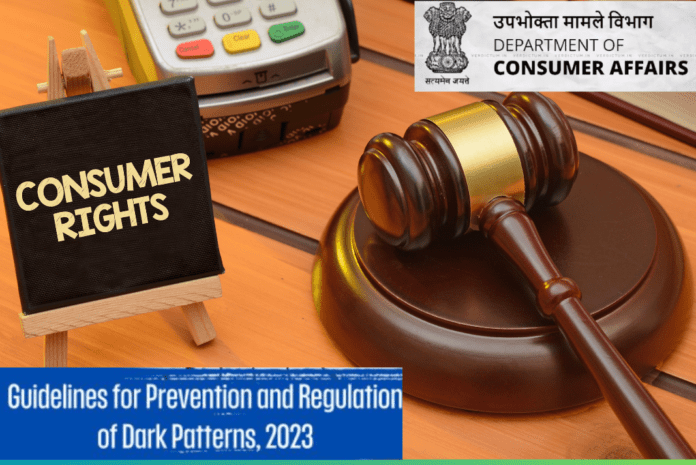The Central Consumer Protection Authority (CCPA) has taken a significant step towards safeguarding consumers from deceptive practices in the online realm. On November 30, 2023, the CCPA issued the ‘Guidelines for Prevention and Regulation of Dark Patterns, 2023’ (Guidelines), effectively taking effect on November 30, 2023. These Guidelines aim to combat the growing prevalence of dark pattern, a term coined to describe deceptive design techniques employed by online platforms to manipulate user behavior and make uninformed choices.
Suggested read: Top reasons why KCR lost elections: 2023 Telangana Assembly Election Results
Table of Contents
‘Guidelines for Prevention and Regulation of Dark Patterns, 2023’
The Guidelines provide a comprehensive framework for identifying and prohibiting dark pattern, encompassing a wide range of deceptive practices such as false scarcity messages, confusing checkout processes, and pre-checked options. By outlining 13 specific dark pattern examples along with illustrative scenarios, the Guidelines offer clear guidance to businesses operating in the Indian digital space.
The CCPA’s intervention underscores the growing recognition of dark pattern as a serious threat to consumer protection. These deceptive tactics can lead to financial harm, privacy violations, psychological distress, and erosion of trust in online platforms. Embracing ethical marketing practices that respect consumer autonomy, transparency, and fairness is crucial for businesses to foster trust and promote a sustainable online environment.
The CCPA’s intervention underscores the growing recognition of dark pattern as a serious threat to consumer protection. These deceptive tactics can lead to financial harm, privacy violations, psychological distress, and erosion of trust in online platforms.
The implementation of the Guidelines marks a pivotal moment in India’s regulatory landscape, signalling a strong commitment to safeguarding consumer rights in the digital era. As the Guidelines take effect, businesses are urged to re-evaluate their design practices and ensure compliance with the CCPA’s directives. By working together, consumers, businesses, and regulators can create a more ethical and responsible online ecosystem.
Key Points of the Guidelines:
- Dark patterns are deceptive design patterns that are used to mislead or trick users into making choices that they originally did not intend to make.
- The guidelines apply to all platforms that offer goods or services in India, as well as advertisers and sellers.
- The guidelines specify a list of 13 dark patterns that are prohibited.
- The guidelines have been issued under section 18 of the Consumer Protection Act 2019.
Questions on ‘Guidelines for Prevention and Regulation of Dark Patterns, 2023’ (Guidelines):
What is the Central Consumer Protection Authority (CCPA)?
A government agency that protects consumers from deceptive practices.
What are dark patterns?
Deceptive design patterns that are used to mislead or trick users.
What is the purpose of the CCPA’s guidelines?
(a) To protect consumers from dark patterns.
(b) To promote fair competition in the online marketplace.
(c) To increase consumer trust in online businesses.
What are some examples of dark patterns?
(a) False scarcity messages.
(b) Confusing checkout processes.
(c) Pre-checked options.
What are the consequences of violating the CCPA’s guidelines?
Consumers could file lawsuits against businesses.
Essay Type Question
Discuss the ethical implications of using dark patterns in online marketing.
The use of dark patterns in online marketing has raised significant ethical concerns due to its deceptive nature and potential to harm consumers. Dark patterns exploit human psychology to manipulate users into making decisions that are not in their best interests. This can lead to a variety of negative consequences, including:
Financial harm: Consumers may be tricked into making unnecessary purchases, signing up for costly subscriptions, or incurring hidden fees.
Privacy violations: Dark patterns can be used to collect personal data from users without their knowledge or consent.
Psychological harm: Consumers may feel frustrated, anxious, or even powerless when they are manipulated by dark patterns.
Erosion of trust: The use of dark patterns can damage consumer trust in businesses and undermine the overall reputation of online marketing.
In addition to these specific harms, the use of dark patterns also raises broader ethical concerns about respect for autonomy, transparency, and fairness. When consumers are manipulated into making decisions without full knowledge or understanding, their autonomy is undermined.
Dark patterns also violate the principle of transparency by obscuring information from consumers and making it difficult for them to make informed choices. Finally, the use of dark patterns creates an unfair playing field, as businesses that use these tactics are able to gain an advantage over their competitors.
Given the significant ethical concerns surrounding dark patterns, there is a growing movement to regulate their use. These guidelines provide a clear definition of dark patterns and prohibit a number of specific practices. However, it is important to note that the guidelines do not provide for any independent penalties or consequences of a violation. As a result, it remains to be seen how effective they will be in curbing the use of dark patterns.
In addition to regulatory action, there is also a need for businesses to adopt ethical marketing practices that respect consumers’ autonomy and make informed choices. This includes avoiding the use of dark patterns, providing clear and transparent information, and respecting the privacy of consumers’ data. By adopting these principles, businesses can build trust with consumers and create a more ethical and sustainable online marketing environment.


